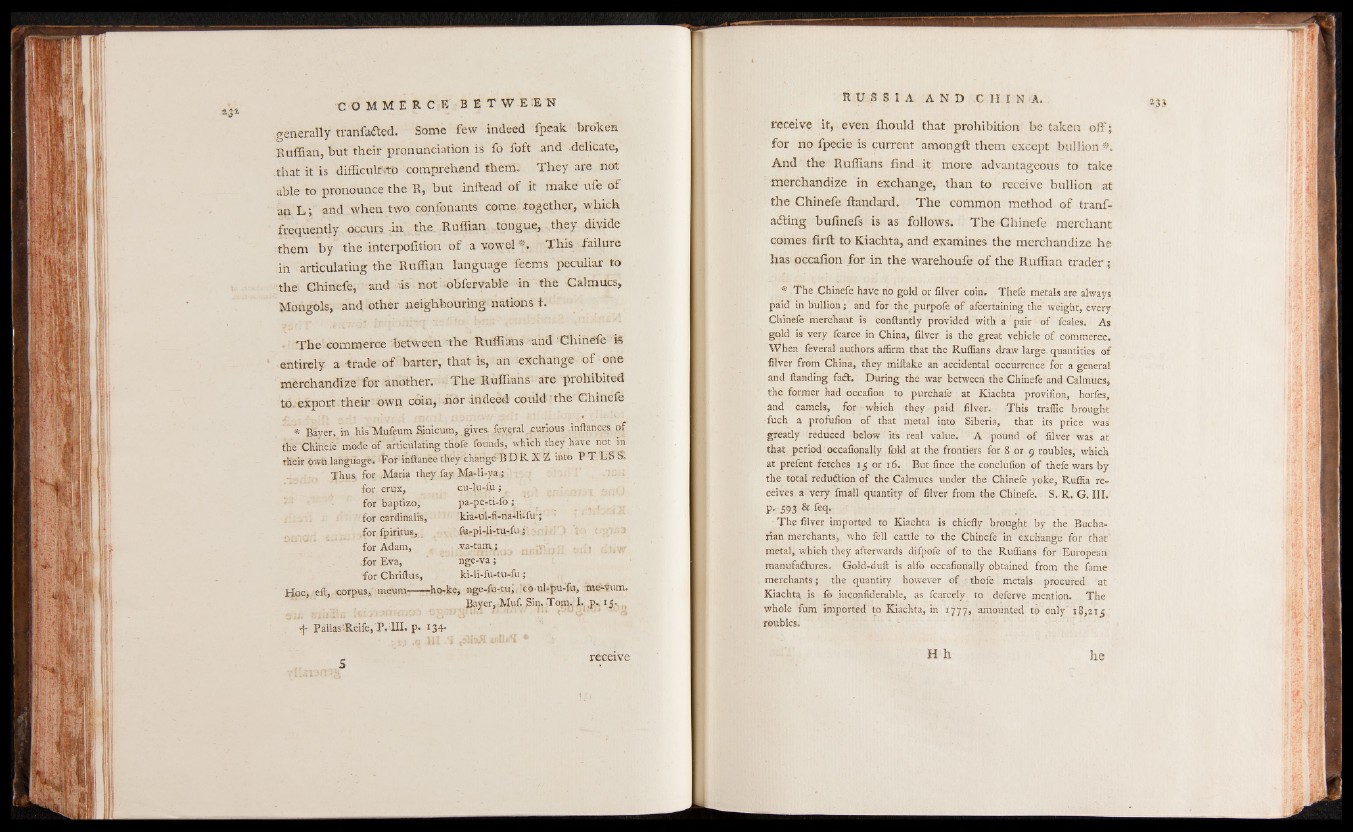
generally tranfailed. Some few indeed fpeak broken
Ruffian, but their pronunciation is fo foft and delicate,
that it is difficult<to comprehend them. They are not
able to pronounce the R, but inftead of it make ufe of
aia L ; and when two confonants come, together, which
frequently occurs .in the Ruffian tongue, they divide
them by the interpofition of a vowel#. This .failure
in articulating the Ruffian language feems peculiar to
the Ghinefe, and is not obfervable in the Calmucs,
Mongols, and other neighbouring nations t.
The commerce -between 'the Ruffians ‘and -Ghinefe i-S
entirely a -trade of barter, that is, an exchange o f one
merchandize for another. The Ruffians are prohibited
to export their own coin, -nor indeed could the Chinefe
* Bayer, m hisMufeum Siriicum, gives, feyeral _c,urious inftances o f
the Chinefe" mode o f articulating tliofe founds, which they have not in
tfteir owb .language. •tor' ihftance thdy changd B D R X 2 into P T. L S S.
Thus, for .Maria they.fay Ma-li-ya,; l
for crtjx,
for baptizo,
■ for cardinalis,
.for. fpiritüs, i
for Adam,
io r Eva,
for Chriltus,
Hoc, corpus, mourn-— -ho-1
f Pallas Reife, P . III. p. 134-
cu-lu-£u; r
pa-pe-ti-lo;
Xia^ul-fi-nadUfu-; ■
fur-pi-li-tu-fu;
.ya^-tam; P '.
nge-va;
ki-li-fu-tu-fu ;
s, nge-fu-ng, "co-ul-pu-fu, fnewum.
Bayer, Muf. Sin. Top^' Ju i. S- ,,
s receive
receive it, even ffiould that prohibition be taken o ff;
for no fpecie is current amongft them except bullion *.
And the Ruffians find it more advantageous to take
merchandize in exchange, than to receive bullion at
the Ghinefe ftandard. The common method of tranf-
a&ing bufinefs is as follows. The Chinefe merchant
comes firft to Kiachta, and examines the merchandize he
has occafion for in the warehoufe of the Ruffian trader;
* The Chinefe have no gold or lilver coin. Thefe metals are always
paid in bullion; and for the,purpofe o f afcertaining the weight, every
Chinefe merchant is conftantly provided with a ’ pair o f fcales. As
gold is very fcarce in China, filver is the great vehicle o f commerce.
When feveral authors affirm that the Ruffians draw large, quantities of
filver from China, they miftake an accidental occurrence for a general
and ftanding fadt. During the war between the Chinefe and Calmucs,
the former had occafion to purchafe at Kiachta provifion, horfes,
and camels, for ■ which they paid filver. This traffic brought
fuch a profufion o f that metal into Siberia, that its price was
greatly reduced below its real value. A pound o f fiiver was at
that period occafionally fold at the frontiers for 8 or 9 roubles, which
at prefent fetches 15 or 16. But fince the conclufion o f thefe wars by
the total redudtion o f the Calmucs under the Chinefe yoke, Ruffia receives,
a very fmall quantity o f filver from the Chinefe. S. R. G . III.
p. 593 & feq.
The filver imported to Kiachta is, chiefly brought by the Buchanan
merchants, who fell cattle to the Chinefe in exchange for that
metal, which they afterwards difpofe o f to the Ruffians for European
manufactures. Gold-duft is alfo occafionally obtained from the fame
merchants; the quantity however of thofe metals procured at
Kiachta. js fo inconfiderable, as fcarcely to deferve mention. The
whole fum imported to Kiachta, in 1777, amounted to only' 18,215
roubles. •
H h he